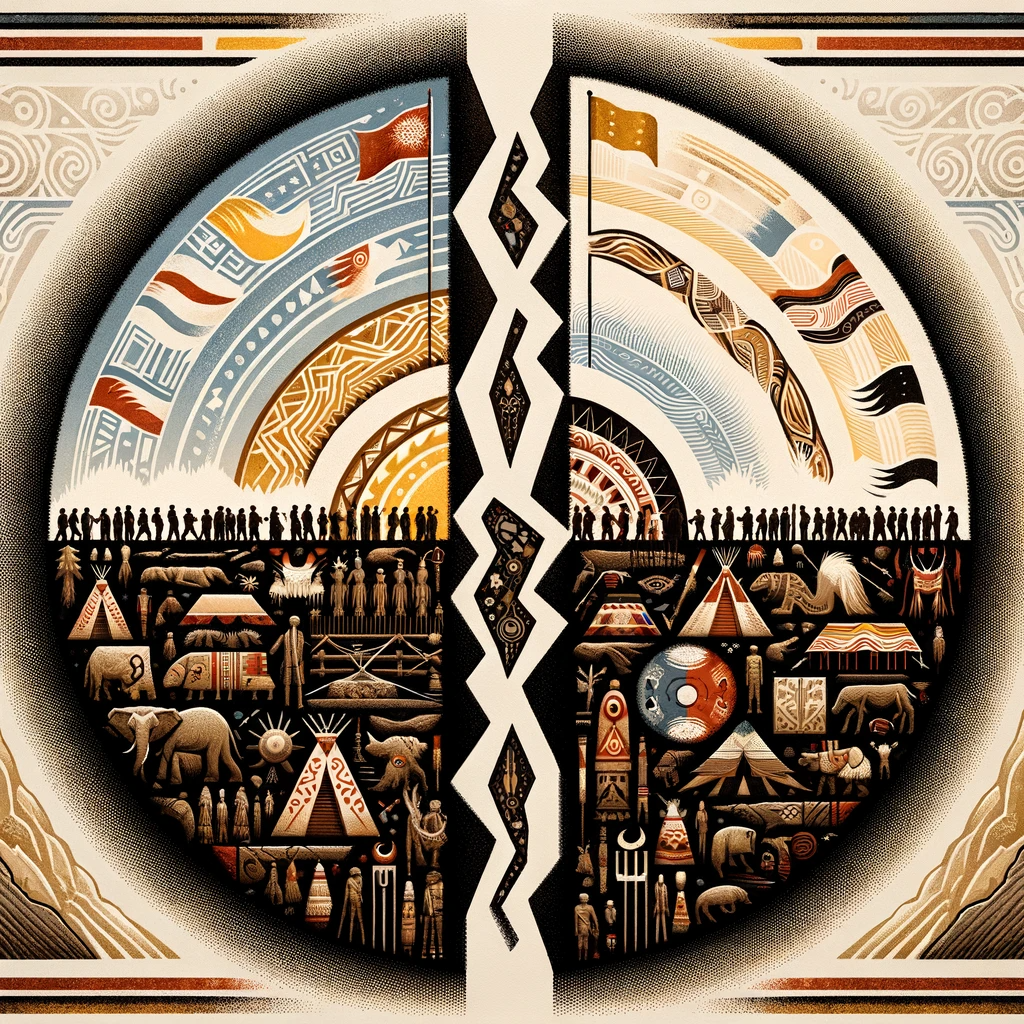Tribal
Definition
Tribal refers to the customs, beliefs, and forms of organization specific to a particular tribe.
Parts of Speech
- Adjective
Pronunciation
American English
- IPA Pronunciation: /ˈtraɪbəl/
- Respelling: TRY-buhl (with "TRY" rhyming with "eye" and "buhl" as in "bull")
British English
- IPA Pronunciation: /ˈtraɪbəl/
- Respelling: TRY-buhl (similar to American English, with "TRY" as in "eye" and "buhl" like in "bull")
In both dialects, "tribal" is pronounced with the primary stress on the first syllable, "TRY," which rhymes with "eye." The second syllable, "buhl," is pronounced like "bull." The pronunciation of "tribal" is consistent between American and British English.
Etymology
The word "tribal" derives from the Latin "tribus," meaning "tribe." It has been used in the English language since the early 17th century to describe things associated with or characteristic of tribes.
Derivatives
- Tribalism
- Tribally
- Tribalize
- Tribalist
- Tribalistic
Synonyms
- Ethnic
- Clan-based
- Kin-group
Antonyms
- Universal
- Modern
- Individualistic
Usage
- "The artwork represents the tribal heritage of the indigenous community."
- "The region has faced ongoing tribal conflicts."
Related Terms
- Tribe
- Tribal leader
- Tribal elder
- Tribal territory
- Tribal warfare
Detailed Definition
Adjective
- Relating to a Tribe: Pertaining to a specific group, especially one that is primitive or that shares the same culture, language, or customs.
- Example: The tribal society values community and shared responsibility.
- Characteristic of a Tribe: Exhibiting the behavior, customs, or characteristics typical of a tribe; using tribal identifiers.
- Example: The tattoo was of a tribal design, showcasing intricate patterns and symbols.
- Organized by Tribes: Organized by, or advocating for, tribal loyalty, especially to the exclusion of other loyalties.
- Example: The political landscape in the area remains heavily tribal, making negotiations difficult.
tribal



🇨🇳 Mandarin
- 部落的 (bùluò de) [tribal]
- IPA: /pu˨˩˦.lwɔ˨˩/ də/
- Respelling: boo-lwaw duh
🇮🇳 Hindi
- जनजातीय (janajātīy) [tribal]
- IPA: /d͡ʒənəd͡ʒɑːtiːj/
- Respelling: jana-jaati-y
🇪🇸 Spanish
- Tribal [tribal]
- IPA: /triˈbal/
- Respelling: tree-bahl
🇫🇷 French
- Tribal [tribal]
- IPA: /tʁi.bal/
- Respelling: tree-bal
🇸🇦 Modern Standard Arabic
- قبلي (qablī) [tribal]
- IPA: /ˈqab.liː/
- Respelling: qab-lee
🇧🇩 Bengali
- উপজাতি (upajāti) [tribal]
- IPA: /upoʤɑːti/
- Respelling: upo-jaati
🇷🇺 Russian
- Племенной (plemennoy) [tribal]
- IPA: /ˈplʲemʲɪnːɨj/
- Respelling: plyem-in-nyoy
🇵🇹 Portuguese
- Tribal [tribal]
- IPA: /tɾiˈbaɫ/
- Respelling: tree-bahl
🇮🇩 Indonesian
- Suku [tribal]
- IPA: /su.ku/
- Respelling: soo-koo
🇩🇪 German
- Stammes- [tribal]
- IPA: /ʃtaməs/
- Respelling: shtam-es
🇯🇵 Japanese
- 部族の (buzoku no) [tribal]
- IPA: /bu.zo.ku no/
- Respelling: boo-zo-koo noh
🇻🇳 Vietnamese
- Thuộc bộ lạc [tribal]
- IPA: /tʰwək˧ bə˨˩ ˧lak˧˥/
- Respelling: thuok boh laak
🇰🇷 Korean
- 부족의 (bujok-ui) [tribal]
- IPA: /pu.t͡ʃok ɰi/
- Respelling: boo-chok-uee
🇹🇷 Turkish
- Kavimsel [tribal]
- IPA: /kaˈvimsel/
- Respelling: kah-vim-sel
🇵🇰 Urdu
- قبیلائی (qabīlā'ī) [tribal]
- IPA: /qaˈbiːlaː.iː/
- Respelling: qa-bee-laa-ee





